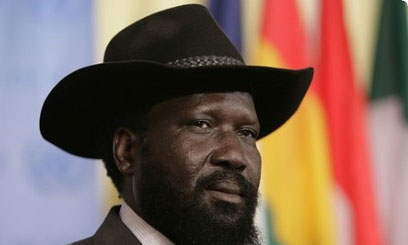S. Sudan president backs deal with Khartoum amid protest
October 15, 2012 (JUBA) – South Sudan president Salva Kiir said on Monday he would not accept his country returning to war with Khartoum over issues which can be addressed by dialogue.

Police used live rounds on the streets of Juba to break up protests on Monday. Demonstrators, predominantly from the Greater Bahr el Ghazal region, are angered by what they perceive as the gifting of parts of their land to Khartoum.
The inclusion of a contentious 14 mile area in the Safe Demilitarized Buffer Zone in one of the agreements, argued speaker of the house, James Wani Igga, in a speech to parliament on Monday, “has to be crystal clear and properly underlined to leave no cloud or doubt and uncalled for speculations. This is not South Sudan alone. It includes some parts of Sudan at the border and at the border claimed or contested areas. It is not South Sudan alone.”
Kiir also emphasised the point that the agreement reached with Khartoum does not give them South Sudan’s land; it is a roadmap to finding a way of resolving the disputes between the neighbouring countries.
In reaction to the protesting at parliament, Kiir stated that “I will respect their opinions but I want to tell you that the 14 mile area which is generating concerns and row belongs to the Dinka Malual. This is a known fact. It was only the British which allowed the Reizigat in Darfur to use it for grazing their cattle.”
Kiir referred to British rule of Sudan which ended in 1956. During this time the colonial rulers gave specific powers to ethnic groups in order to further their ends. It is believed by some that the Reizgat ethnic group were given grazing rites to the region formerly known as the Munroe-Wheatley area.
The Dinka, on the other hand, are South Sudan’s most politically powerful ethnic group.
Kiir noted that the negotiating team did not have the mandate to give land to Khartoum and the purpose of the talks was to allow for oil exporting to resume. South Sudan halted production in January in a row with Khartoum over transit fees.
Keen to highlight his patriotic credentials, Kiir said, “I fought for more than 20 years [rebelling against the Khartoum government]. I do not know how long those demonstrating fought.”
He said he was criticized when he signed the Machakos protocol on self-determination in 2005 but those who were opposed to the provision celebrated the independence of the new nation in 2011.
He accused the same politicians who were critical of his signing of the protocol of inciting people to demonstrate, “to advantage their own interest. This is the way to get them. It is bad practice. Violence does not solve issues.”
He expressed his government’s commitment to continue pressing forward for peaceful solutions to areas contested by Khartoum but that there are certainties:
“We will not relinquish Panthou [Heglig]. It is home land of Panru people in Unity State. We will also not relinquish Hufra Nahas, Kifia Kinji, Joda, Magnes and many other areas which are historically part of this country,” said Kiir.
Backing Kiir, Igga stated that “if there is anybody against it, it is probably out of disinformation prior to keenly and meticulously perusing and studying the agreement document.”
South Sudan announced on 5 October that a committee would be formed to educate government officials and the civil population on the agreements reached with Khartoum.
Igga said that the purpose of the agreements is to restore peace, in order to create the correct environment for development to take place.
He said the importance of the planned buffer zone is that it would allow international monitors to assess the situation.
But General Garang Mabil, who has long been one a close military ally of Kiir’s, said those pushing for implementation of the agreement are not honest.
“I have said several times that the so called additional special arrangement inserted in article three of the security arrangement was unjustifiably inserted. The 14 mile area has never been part of Sudan. It is a known area for Dinka Malual. I fought there in seventies myself.”
(ST)
